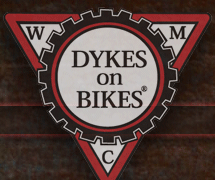
Back Dykes on Bikes German Dykes on Bikes Spanish Dykes on Bikes French דייקס און בייקס HE Dykes on Bikes Swedish
 | |
| Abbreviation | DOB |
|---|---|
| Founded | 4 July 1976 |
| Founded at | San Francisco, CA, U.S. |
| Type | 501(c)(3) |
| Purpose | Lesbian motorcycle riders |
Region | US, Canada, Australia, UK |
| Membership | 22 chapters |
Road Captain/President | Kate Brown |
| Website | www |


Dykes on Bikes (DOB) is a chartered[1] lesbian motorcycle club with 22 chapters,[2] numerous affiliations,[3] and 501(c)(3) nonprofit status.[4] They are known for their participation in gay pride events such as Pride parades, and significant LGBTQ+ events like the international Gay Games.[5]
The loud bikes and presence remain at the front of the parade for security and logistical reasons, and a celebrated place of honor today as a symbol of LGBT pride, defiance, liberation and empowerment.[6] The contingents are fiercely independent and self-reliant in the DIY and feminist traditions and have been studied as a social phenomenon as a "complex, multilayered form of consumption-related cultural resistance that raises awareness of social injustice and discursively informs social meanings in everyday life outside the festivals."[7]
Along with drag queens, the DOB have been criticized for not portraying a more acceptable image of LGBT culture. Supporters, however, counter that they are highly visible icons of gay pride who refuse to assimilate and conform to mainstream society gender roles, and indeed remind of the butches and queens who helped lead the Stonewall riots launching the modern gay-rights movement.[8]
The Dykes on Bikes have been criticized for using the term dyke in their name. When registering their name as a trademark in the United States, the group faced a battle to demonstrate that the word dyke, and related terms such as terms diesel-dyke, bull-dyke, and bull-dagger, have in fact been re-appropriated as self-referential terms of endearment and empowerment distinct from lesbian and indeed awards and events utilizing those names are now used by the LGBT community.[9] In keeping with the tradition of motorcyclists' rejection of the norms of middle-class, middle-America, the Dykes on Bikes teach, by example, that women can be masculine and challenge the dominant sexual and cultural expectations of what a woman is and what she can do and achieve.[9][10]
- ^ "C1915232 San Francisco Dykes on Bikes Women's Motorcycle Contingent". Business Search - Entity Detail. California Secretary of State. Retrieved March 14, 2020.[failed verification]
- ^ "Official website: Chapters". Archived from the original on September 19, 2016.
- ^ Boslaugh, Sarah (March 2006). "Getting Past the Stereotypes: Women and Motorcycles in Recent Lesbian Novels". International Journal of Motorcycle Studies. Archived from the original on April 24, 2018. Retrieved April 23, 2021.
- ^ "San Francisco Dykes on Bikes Womens Motorcycle Contingent". Tax Exempt Organization Search Internal Revenue Service. Retrieved April 21, 2021.
- ^ Rowe, David; Markwell, Kevin; Stevenson, Deborah (July 2006). "Exploring participants' experiences of the Gay Games: intersections of sport, gender and sexuality". International Journal of Media and Cultural Politics. 2 (2): 149. doi:10.1386/macp.2.2.149/1. S2CID 144895422.
- ^ O'Brien, Jodi. "Changing The Subject". Echo NYC. Archived from the original on June 4, 2004. Retrieved August 18, 2007.
- ^ Kates (Monash University), Steven M.; Belk (University of Utah), Russell W. (2001). "The Meanings of Lesbian and Gay Pride Day: Resistance through Consumption and Resistance to Consumption". Journal of Contemporary Ethnography. 30 (4). Sage Publications: 392–429. doi:10.1177/089124101030004003. S2CID 145168122. Retrieved August 18, 2007.
- ^ Gluckman, Amy; Reed, Betsy (1997). Homo Economics: Capitalism, Community, and Lesbian and Gay Life. Routledge. ISBN 978-0-415-91379-9. Retrieved August 19, 2007.
- ^ a b Ilyasova, K. Alex (November 2006). "Dykes on Bikes and the Regulation of Vulgarity". International Journal of Motorcycle Studies. Retrieved August 21, 2007.
{{cite journal}}: Cite journal requires|journal=(help) - ^ Epstein, Debbie; Johnson, Richard (1998). "Schooling Sexualities". Buckingham: Open University Press. p. 19. Retrieved August 21, 2007.